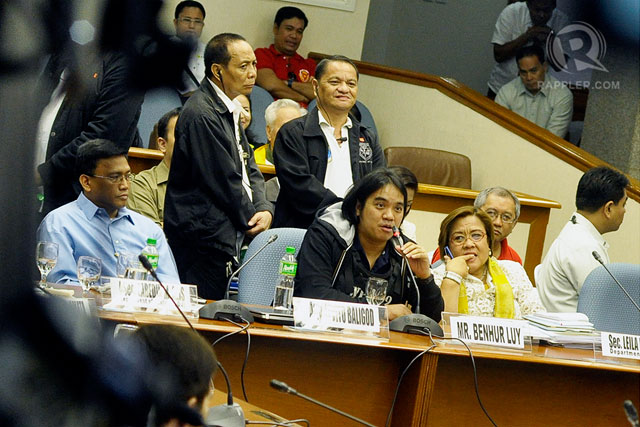SUMMARY
This is AI generated summarization, which may have errors. For context, always refer to the full article.

MANILA, Philippines – The organizations operated by Janet Lim-Napoles shifted their dealings from national government agencies (NGAs) to local government units (LGUs) under the Aquino administration.
This was after the new government changed the “menu” of projects that can be funded by lawmakers’ Priority Development Assistance Fund (PDAF) and disallowed the usual government corporations as its recipients.
This made it difficult for Napoles’ fake non-governmental organizations (NGOs) to access and pocket government funds like they used to, pork barrel scam whistleblower Benhur Luy told a Senate hearing on Thursday, September 12.
Luy told the Senate blue ribbon committee that while Napoles’ NGOs had only ghost projects under the Arroyo administration – the entire PDAFs of conniving lawmakers were split between Napoles and the lawmakers – they were forced to have actual projects and make some deliveries from 2010 to 2012.
With government corporations out of the picture, the budget department and agencies started releasing the PDAF to LGUs. With LGUs as clients, Napoles’ organizations had to perform somehow.
The Napoles NGOs at most used to “deliver maybe 10-20%” before; the rest were “undelivered” or ghost projects.
The Department of Budget and Management by then had started to tighten the screws and demanded requirements for the accreditation of NGOs, such as the submission of a certificate of good standing from the Securities and Exchange Commission (SEC). The SEC did not readily issue such certificates.
From 2010-2012, there were requirements that implementing agencies started to ask for and which were not as easy to secure, Luy said.
He said transactions were being audited both at the agency and the LGU levels.
In 2011, the Commission on Audit (COA) wrote Napoles about anomalies linked to her NGOs.
Luy said it was around this time when he realized there could be irregularities in Napoles’ businesses. Luy started working with Napoles in 2002, but was made an officer of her bogus NGOs around 2007.
‘Normal’
“In 2004 we delivered, but the case was overpricing. We delivered [some projects] in the years after that too,” he said.
He said he didn’t think there was anything wrong in what they were doing and in the commissions they gave government officials because when he first came in, “my seniors did the same thing so I thought it was normal.”
The fact that there were no intensive audits of their NGOs until the COA came in 2011 led Luy to believe that Napoles’ business was legitimate, he said.
Napoles is accused of conniving with lawmakers to channel their PDAF or pork barrel to her fake NGOs and giving them commissions in return.
A COA special audit of the PDAF from 2007-2009 revealed that several of Napoles’ NGOs misused P2.1 billion in lawmakers’ pork barrel.
Other masterminds?
The COA report also exposed other NGOs which made dubious transactions with the government.
Luy said Napoles never mentioned other “masterminds” to him who were doing the same thing, although he said there were talks in the office that there were other groups that did similar things.
“I don’t know of other syndicates, she never mentioned others to me. In the office they mentioned others who transacted with the government but we didn’t care. We were focused on our own transactions,” he said.
Of those he knew about, he said the COA report listed them too. He did not name them.
He emphasized it was Napoles who knew everything about the transactions of her NGOs, although he mentioned that her husband Jaime was always around. Besides him, he said Napoles’ two children were also involved.
He didn’t mention the names of the children, but said Jaime and one child was involved in finance, while the “boy” was involved in operations.
Napoles’ eldest daughter is Jo Christine, while her son is James. Both have appeared as incorporators in some of Napoles’ businesses.
Falling out
Luy said he started having arguments with Napoles in 2010, when he started asking questions about shipments that were undelivered and incomplete. He said Napoles would get angry when they interfered or asked questions.
Later, Luy said he and other employees started to meet after auditors started coming to the office and asking questions.
“We were so scared, but we didn’t know who to tell because she was so influential,” he said.
Luy said Napoles also gathered her employees, including her drivers and other individuals whose identities she used as dummy incorporators of her fake NGOs. She told them her name could not come out in case something happened, “so she could work her connections” to help them out.
Luy said that’s when the employees started considering speaking out.
“I told them, ‘Kawawa naman tayo (Woe to us). None of us benefitted from any of this.’ Yes, money was transmitted to my account but remittances all went to Napoles and her partners. I’m just a dummy here,” he said.
“I said, bahala na kung ano’ng mangyari (We’ll see what happens) but I have to tell everything. For the country, I will do it,” Luy said. – Rappler.com
Add a comment
How does this make you feel?
There are no comments yet. Add your comment to start the conversation.